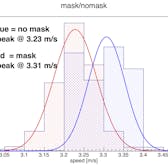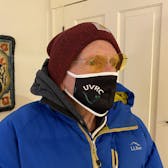How does running benefit the immune system?
Got a question for the coaches? Send it to newsletter@uppervalleyrunningclub.org and I'll send it on!
How does running benefit the immune system and is there more immune boosting benefit when running outside compared to inside?
— Julia
Jim Burnett
To run is to use and exercise the body-machine you were born with and that you have developed over time. Running can only benefit your immune system if you eat and drink healthy foods and fluids and breathe clean air while stressing your body and allowing it to recover in equal measure. The beauty of running and exercise is that they can accelerate your fitness and health by fortifying your immune system as you go. Ergo, never stop running.

Jim Burnett
Jim Burnett is a long time runner and former President of the Upper Valley Running Club
Carly Wynn
This is such a good question, because while the link between aerobic exercise in general (not just running) and improved health is not disputed, the causal link does not yet definitively show that exercise improves immune function. Many of the ways we know exercise to help us stave off disease and illness are secondary effects, for example: exercise helps us maintain healthy body composition, lower blood pressure, etc. ergo we are less likely to get heart disease, diabetes, etc. It is not necessarily the case that our immune system, per se, has benefited from exercise.
That said, the "immune system" is a pretty complex and multifaceted thing, so trying to define exactly what counts as strengthening the immune system would get us into the weeds pretty quickly. One theory about how exercise may benefit the web of our immune system is that exercise increases circulation, effectively helping the disease-fighting cells in our blood get all around the body faster, thereby helping these cells identify and destroy disease cells more rapidly. While it paints a nice image, this theory is not yet proven.
To me, one of the clearest links between exercise and health is the effect exercise has of lowering cortisol and other effects of stress, such as inflammation, while promoting feel-good hormones like endorphins. In terms of a direct effect on the immune system, things are once again murky. But we do know that chronically high cortisol and inflammation levels lead to an increased risk of infection and disease across the spectrum. So again, a secondary effect that, while it may not be about the immune system per se, demonstrably leads to better health outcomes. I will add here that exercise is, in fact, a stressor, so all training, particularly hard training, needs to be accompanied by sufficient recovery in all its modalities in order to not negate its own benefits.
As far as outdoors v. indoors, I would say that in most cases, some exercise is better than no exercise, so if it's a choice between running indoors and not running, run indoors. There are cases where running indoors may, in fact, be better for health, such as in the case of air quality concerns or very cold temperatures. (Particles in the air, from smog/pollution to smoke to pollen can be detrimental to lung and/or function, sometimes temporarily, sometimes permanently. While it's not true that "getting cold gives you a cold," breathing hard in frigid temperatures can irritate sensitive airways and make them temporarily more susceptible to infection. The "frigid" point is going to be different for everyone.) There may also be cases where running indoors is the only option from a safety perspective, so again, indoors is better than not at all.
But in most cases, I would argue for the benefits of running outdoors. Assuming the air outside is sufficiently clean, it strikes my sensibilities that if I'm going to be breathing hard, I want the freshest air, not some recirculated air that smells like rubber. Pollutants and particulates can get trapped in indoor air, and not disperse as they would outside. I also have a hunch that it's good for us to feel what's going on in our natural environment, and the physical and mental health benefits of time in nature are multifold, though science is really just at the tip of the iceberg in terms of understanding all the effects. Tuning into natural daylight helps set our circadian rhythm so we sleep better, and sleep is crucial for everything health-related. To boot, we should get outdoors because outdoors is where we will encounter sunlight, and sunlight prompts us to produce Vitamin D, and, well, we know how important Vitamin D is for health!

Carly Wynn
Carly Wynn is a personal coach at www.CarlyOutside.com, and can be reached at Carly@CarlyOutside.com
Tim Smith
I think Carly hit the big physiological points, leaving me little to add. But I'll start by repeating one of her points; as far as I understand it, exercise/running doesn't directly change your immune system. But it most certainly helps get through an ailment and speeds the recovery.
I'll also add that adrenaline has all sorts of good effects on the respiratory system. I suffer from hay fever and find that in heart of that allergy season the easiest breathing of the day is in the middle of a long run. In fact the same is true for colds and anything which leads to congestion.
About outdoor vs. indoor. As Carly said, one place may have cleaner air then the other. But I think a bigger point is, in which venue are you more likely to engage? Work out in a place which makes you happy and makes you want to be there again the next day.

Tim Smith
Tim Smith is the former two-time president of the UVRC, and coaches winter TNT for UVRC.
Carly Wynn
Tim, that's a fascinating point about adrenaline. I had never really thought of it that way. I have severe food allergies and am more familiar with epipens then I care to say, so of course I know that epinephrine is a bronchodilator. But I had never considered that the release of epinephrine could be one reason why I too breathe easier in workouts than I do under many other circumstances. Cool!

Carly Wynn
Carly Wynn is a personal coach at www.CarlyOutside.com, and can be reached at Carly@CarlyOutside.com





